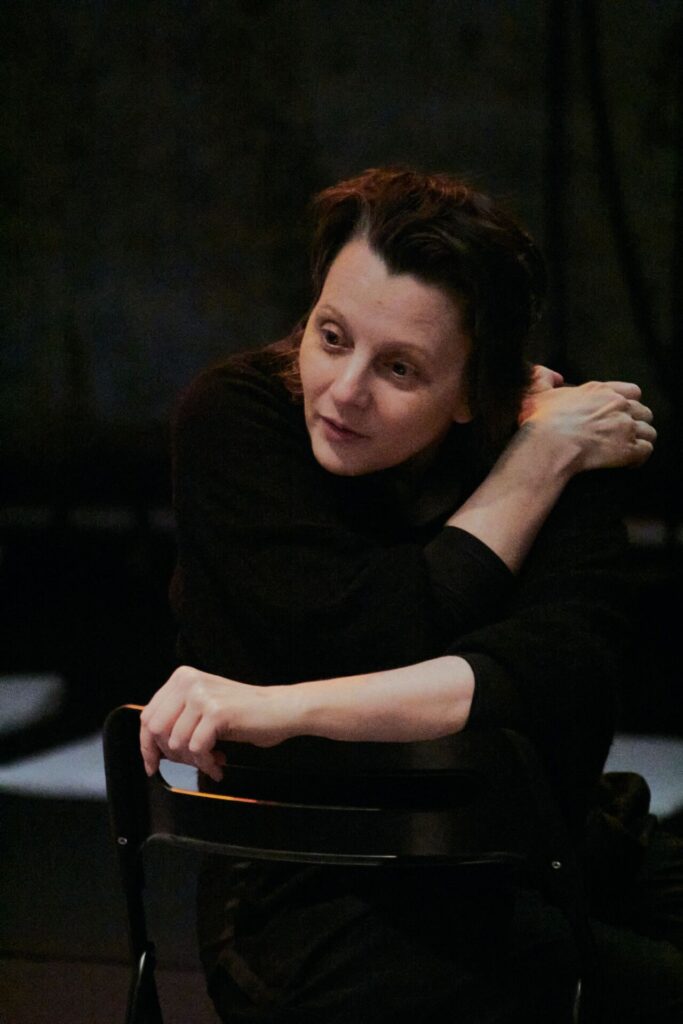
Oxana Sankova maakt en speelt nieuwe voorstelling
Q&A 'The poem without a Hero'
Oxana Sankova groeide op in Rusland en behaalde haar acteursdiploma aan GITIS (Moskou). Na vijftien jaar acteren besloot ze regie te studeren aan het RITCS in Brussel. Haar bachelorvoorstelling I forgot werd opgepikt door Theater aan Zee en speelde in 2022 in Monty. Nu maakt én speelt ze ‘The poem without a Hero‘, een autobiografische voorstelling over de invloed van overheidsideologie en nationalisme op de gewone mens, over angst en schaamte.
What made you transition from acting to directing, and now to creating your own autobiographical performance?
Initially, while living in Moscow and working there, I always had this dream of going to Europe to study theater, particularly European theater. However, it remained a dream for many years. Then, at a certain point, I realized that my son had suddenly reached adulthood – he was nearly 20. I thought, perhaps now is my time to pursue that dream. With my age already surpassing 40, I felt a sense of now or never. It began as an adventure, more of a curiosity to explore and break out of the confines I had grown accustomed to. I wanted to delve deeper into theater, both in terms of its general essence and specifically how it was organized in European contexts.
Could you tell us a bit more about how you combine the exploration of the impact of governmental ideology and your personal experience in this performance?
Unfortunately, the intrusion of political matters into our everyday lives has become an undeniable reality in my country. This makes it impossible for individuals to claim disinterest in politics. It has permeated our social interactions and daily routines. While some may attempt to shield themselves from these issues, the reality is that political concerns are undeniable. People strive to preserve their mental and physical well-being by building up walls to block out these disturbances. However, the political climate inevitably seeps into various aspects of life.
Fear and shame seem to be central themes in your work. Could you tell us a bit more about how these themes influence this performance in particular?
The persistent fear that accompanies everyday life is a consequence of the ideologies and governmental systems that shape our existence. It’s ingrained in our emotions and experiences. While people in other countries may not directly encounter this specific fear, various other fears pervade our lives. Political dynamics are a profound influence, extending beyond borders like Russia to affect nations worldwide. This is not a narrative confined to Russia; it’s a global phenomenon. The unexpected rise of figures like Trump in supposedly democratic nations, or the emergence of ultra-right factions in places like Belgium, echoes dark chapters of history, such as fascist regimes in Germany. It’s a cycle, indicating that history is repeating itself and we learned too little.
How does this production differ from previous work, and what discoveries have you made through the process of writing, directing, and performing in The Poem Without a Hero?
The Poem Without a Hero differs a bit from my previous work, for example I Forgot, which featured a very small role for me. In this production, I am not only the writer and director but also the primary performer. While this affords me a deep level of involvement in every aspect of the production, it also presents some challenges. Being the sole actor on stage while also managing production logistics can be daunting, especially since this is a much bigger production than I Forgot, which was a student play. Initially, I contemplated involving other actresses, but the deeply personal nature of the story made it difficult to envision anyone else portraying it. Despite the challenges, this production has been a tremendous learning experience, allowing me to explore facets of myself and my work in new ways.
Interview by Eva Höelsgens